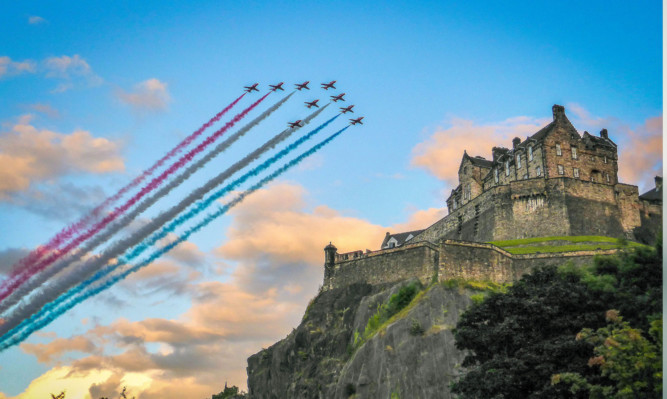
“Never have so many stunning images of Scotland been sent round the globe. And never in such a good cause.”
So Scotland’s tourist industry has finally cracked it.
Latest figures show 615,000 folk from overseas piled into our wee country the highest number since 2007. They spent a record half-billion pounds up a third in just a year.
The Americans topped the league table for visitor numbers and spending as they used to before Iraq changed world thinking and confidence about transatlantic travel. It’s all good news.
But, of course, folk will say, if tourism couldn’t thrive in the year of the Commonwealth Games and Ryder Cup, when could it? The only thing is, the bumper year for tourism I’m describing was not this year but 2013. Strange, eh?
Of course last year had a few things going for it. A weak pound made the tourist dollar go further and the weather was fabulous here and elsewhere. But based on frequent trips to the wealthy Nordic nations, I’d say there was another factor explaining Scotland’s visitor success in 2013 visibility on the international stage.
Normally if you mention Scotland to Norwegians they’ll tell you they love whisky (and usually know more about malts than we do), they’ll say they have dreamed of exploring our ancient castles (since they build in wood, the Nordics have few truly historic buildings), they have convenient, direct flights and they love what they’ve heard about the Edinburgh Festival. So have they been?
Well, er… no.
Why not? After all with the relative strength of their currencies, Nordic visitors could probably buy half of Princes Street?
It’s hard to get a clear answer. Instead you often get an animated account of their last fun-filled trip to Ireland.
Why? Why visit Ireland not Scotland when we are nearer and have more islands, mountains, beaches, lochs, spectacular diversity of scenery, the same amount of Gaelic song and music and cities every bit as lively as Dublin?
What has Ireland got that we don’t?
Well, it’s got that famously friendly welcome, rivers you can afford to fish without needing a second mortgage, a truly relaxed attitude to life even in the midst of a recession and hot food served all day because pubs and hotels tend to be owned by locals living on the premises not chains with hired-in help.
And there is one other thing of course. Ireland is visible as a country and culture in its own right not as part of a wider “UK” offer.
Maybe, in 2013, that’s what started to change. Maybe, the referendum finally gave Scotland visibility too. Last year TV reporters from every country on earth stood before the striking backdrops of Edinburgh and Stirling castles, the classy streetscapes of Glasgow and on ferries to the islands of Shetland, Orkney and the Hebrides. Never have so many stunning images of Scotland been sent round the globe. And never in such a good cause.
Scotland grabbed world attention not because we’d come bottom of a European health league table (again) or been beaten by another footballing minnow, but because Scots have been absorbed in the most peaceful and genuinely colourful exercise in democratic decision making anywhere in our anxious and troubled world.
Maybe, that McFeelgood factor prompted some wannabe visitors to take the plunge and finally give Scotland a try. Who knows?
All that’s (nearly) certain is that 2014 referendum year itself will beat the record visitor year of 2013.
Irishman Oscar Wilde once said that the only thing worse than being talked about is not being talked about.
He couldn’t possibly have been talking about Scotland’s Big Day on September 18, 2014 but he was absolutely right.

Enjoy the convenience of having The Sunday Post delivered as a digital ePaper straight to your smartphone, tablet or computer.
Subscribe for only £5.49 a month and enjoy all the benefits of the printed paper as a digital replica.
Subscribe